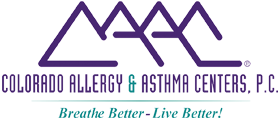Nose bleeds, or epistaxis in medical terms, are common, particularly in Colorado’s dry climate. They occur most often in children between the ages of 2-10 and adults 45-65. While they can be startling or even a little frightening, most nose bleeds are non-serious can be managed from home.
Common causes of nosebleeds include irritation from dry air, tissue inflammation from having allergies, colds or sinus problems, a side effect from medication, drug use, or injury to the nose (which includes nose picking)! People on blood thinners may have nosebleeds more often.
What to do if you develop a nosebleed:
Sit down and gently pinch the soft part of your nose so both nostrils are closed for a minimum of 5 minutes for young children and 10 minutes for older children and adults. This usually gives your body enough time to allow a clot to form. Set a timer and resist the urge to check your nose before the timer goes off. If you release pressure too early, it could disrupt the clot forming your nose bleed could start back up. Lean forward versus back and breath through your nose. Lying down or tilting your head back can cause you to choke or swallow blood.
If after 10 full minutes of uninterrupted nose pinching, your nose is still bleeding, you can dampen a small cotton ball with the over the counter nasal decongestant oxymetazoline (brand name Afrin) then gently insert it into the side that is bleeding. Then pinch your nose again and hold for another 10 minutes – remember, no early checking! If your bleeding still hasn’t stopped after this time, you should be seen by a medical professional.
Other reasons to be seen immediately by a medical profession include situations where there was head trauma, the nose bleed is gushing, the person is feeling woozy or having respiratory distress, the person recently had surgery on their nose or sinuses, or there is a known nasal tumor.
If you get nose bleeds frequently, speak with your provider at Colorado Allergy and Asthma Centers. Sometimes an adjustment in medication is necessary if you use nasal sprays. Other ways to help prevent nose bleeds are using over the counter saline sprays to add moisture to the nasal tissue, running a humidifier in your bedroom at night, or applying coconut oil or a commercial nasal gel such as Ayr or Neilmed to the inside of your nose at night. Avoid picking your nose. Occasionally a referral to an Ear Nose and Throat specialist to have an irritated blood vessel cauterized is helpful if these treatments aren’t helping. Please contact your Colorado Allergy and Asthma Centers home office if you have any other questions or concerns!
Category: Uncategorized



